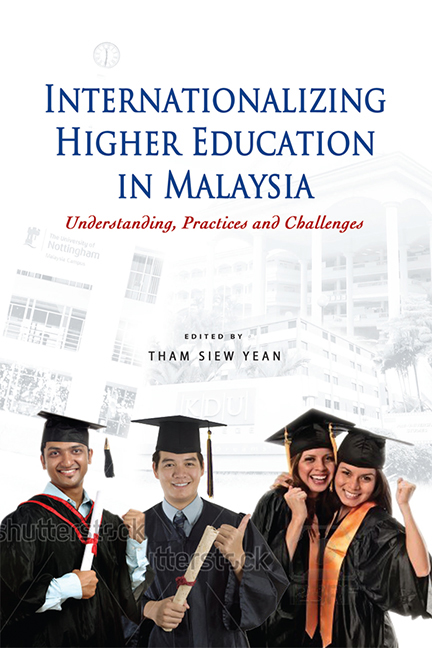Book contents
- Frontmatter
- Contents
- List of Tables
- List of Figures
- Preface
- Contributors
- 1 From the Movement of Itinerant Scholars to a Strategic Process
- 2 Towards Understanding the Internationalization of Higher Education and its Challenges
- 3 Public Universities: Development and Internationalization
- 4 Private Higher Education Institutions: Development and Internationalization
- 5 Macro Perspectives: Ideas, Practices and Challenges
- 6 Micro Perspectives: Ideas, Practices and Challenges
- 7 Concluding Remarks
- Index
7 - Concluding Remarks
Published online by Cambridge University Press: 21 October 2015
- Frontmatter
- Contents
- List of Tables
- List of Figures
- Preface
- Contributors
- 1 From the Movement of Itinerant Scholars to a Strategic Process
- 2 Towards Understanding the Internationalization of Higher Education and its Challenges
- 3 Public Universities: Development and Internationalization
- 4 Private Higher Education Institutions: Development and Internationalization
- 5 Macro Perspectives: Ideas, Practices and Challenges
- 6 Micro Perspectives: Ideas, Practices and Challenges
- 7 Concluding Remarks
- Index
Summary
DIVERSITIES AND SIMILARITIES
Before summarizing the main findings in this book, some caveats are in order. In general it is quite difficult to conduct surveys and collect primary data in Malaysia as respondents are by and large, wary of the motivations behind such surveys. We have followed up each of the survey respondent for focus groups (FG) discussions but given the general reluctance, these discussions are in the end based on individual respondent's willingness to respond. Overall, the small sample size of our survey has limited us from conducting more statistical testing. Further, while the findings reveal certain interesting aspects of internationalization, it may not have captured all aspects, given the very complex nature of the phenomenon as shown in Chapter 2.
Bearing these caveats in mind, the main findings show that while the top management of each institution, as represented by those who responded to the survey instrument, appear to have a more comprehensive understanding of internationalization, focus group discussions display a rich diversity of understanding. This diversity is not dichotomous in nature. Instead, it lies in a continuum from a strictly instrumentalist view to a broader and more comprehensive view of internationalization. In the case of the former, internationalization is seen as a means for generating more revenue while the latter view envisages internationalization as a means for enhancing the academic standing of a university as a centre of learning and knowledge creation.
In terms of practices, there is a strong association of internationalization with various types of mobility such as students, programmes and faculty mobility. This may be expressed in terms of curriculum design such as having an international/intercultural dimension in the curriculum as well as crossinstitutional agreements and the recruitment of international students. Staff mobility is viewed in terms of two way exchanges of faculty members and the establishment of professorial chairs to draw in world renowned scholars for collaborative research, exposure, and learning purposes.
- Type
- Chapter
- Information
- Internationalizing Higher Education in MalaysiaUnderstanding, Practices and Challenges, pp. 132 - 138Publisher: ISEAS–Yusof Ishak InstitutePrint publication year: 2012

